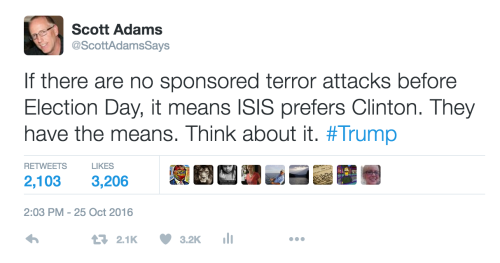Guest Post by Scott Adams
Let’s talk about Trump’s foreign policy speech from a persuasion standpoint.
Trump read from the teleprompter and acted more “presidential,” whatever that means. And he softened his position on Muslim immigration to “extreme vetting.” That was a good strategy for rebranding himself as less scary, but I doubt many people will watch that speech, so it won’t have much impact.
Anyway, let’s talk about what else Trump got right – or wrong – persuasion-wise.
I thought it was a big mistake for Trump to use the word “vicious” when talking about the search for potential terrorists in the homeland. That only makes Trump look scarier. And scariness is his biggest problem right now.
It was also a big mistake to talk about taking the oil from Iraq to pay for the wounded soldiers and their families. Trump could have sold his “take the oil” idea by clarifying that the funds would pay for our military presence to keep Iraq secure, for the benefit of Iraqis. And part of that budget could go to wounded vets and military families. That would sound better.
I watched Clinton surrogates on CNN criticize Trump’s speech, and their criticisms were mostly these two:
1. All of Trump’s foreign policy ideas are crazy and uninformed.
2. Obama is already wisely doing all of those same things.
That would seem absurd in any other context. But keep in mind that we voters believe we can assess foreign policy ideas by listening to biased liars talk on television. So the entire situation is ridiculous, but we play along.
Continue reading “Trump’s Foreign Policy Speech”









